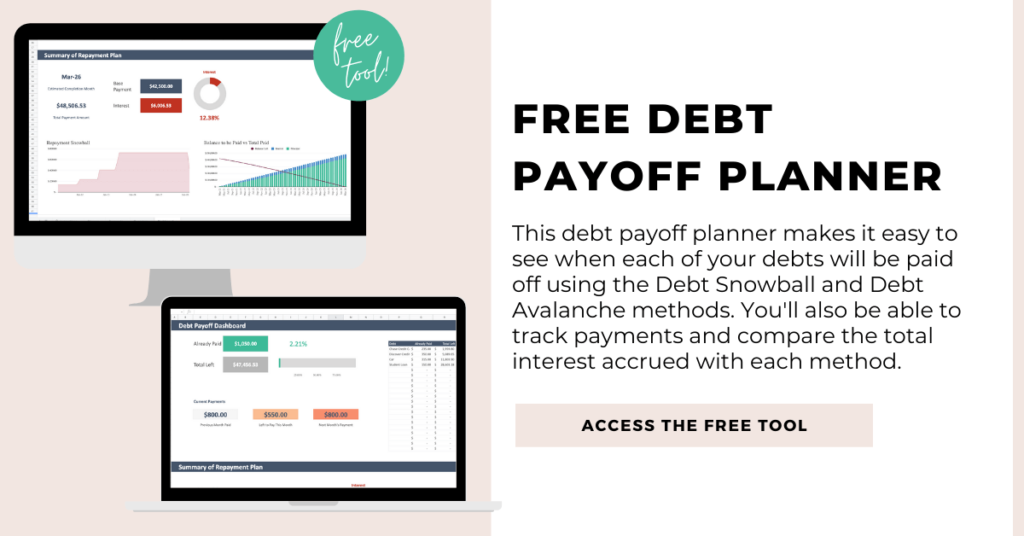Should I Refinance My Student Loans? Things You Must Consider
If you’ve grown tired of paying your student loans years after you graduated, you may wonder, ‘Should I refinance my student loans?’ For many people, the answer is ‘yes,’ but not everyone. Before you do, know what it entails, the consequences if you can’t afford the new loan, and what you lose if you give up your federal student loans.
Some of the links in this post are affiliate links. We may receive compensation when you click on links to products at no extra charge to you. View our full disclaimer.
- What Is Student Loan Refinancing?
- Student Loan Refinancing vs. Consolidation
- Pros and Cons of Refinancing Student Loans
- Should I Refinance My Student Loans?
- When You Should Refinance Your Student Loans
- When You Shouldn’t Refinance Your Student Loans
- How to Apply for Student Loan Refinancing
- Student Loan Refinancing Alternatives
- Should I Refinance My Student Loans FAQ
Should I Refinance My Student Loans? Things You Must Consider
What Is Student Loan Refinancing?
When you refinance student loans, you pay off your existing student loans and replace them with a new loan. You may save money refinancing your student loans if you can secure lower interest rates and don’t need a special payment plan to make the loans more affordable.
It’s just one of the several options you have when trying to get out of student loan debt.
Student Loan Refinancing vs. Consolidation
Student loan refinancing and consolidation are often mistaken for the same thing, but they are different.
Student loan refinancing is for federal or private student loans – you pay off each loan with the new loan proceeds. Student loan refinance programs are provided by private lenders, not the federal government. Therefore, you will lose any federal benefits you would be eligible for once you pay off the federal loans.
Consolidation only applies to federal student loans. Rather than refinancing your loans, it combines your student loans into one loan. You’ll pay an interest rate that’s the weighted average of your existing loans. There aren’t any monetary benefits unless you extend the loan term, which means lower payments, but you could end up paying more in interest. Consolidation is often required before you can take advantage of any income-based repayment plans.
How Much Could It Save You?
Every borrower will save a different amount when refinancing student loans. Some save tens of thousands of dollars, and others save much less.
The exact savings depend on the new interest rate, the amount you borrow, and the term. If you can afford a shorter term and have great credit to secure the lowest rates, you’ll save the most money.
The good news is there aren’t fees to refinance student loans, but there are requirements, and of course, interest, so it’s worth shopping around to find the best rate.
To check out how much you might save, see what rates you qualify for – there’s no obligation, and it doesn’t hurt your credit to check your rate.

Pros and Cons of Refinancing Student Loans
Refinancing your student loans has its pros and cons, just like refinancing any other loan. Knowing the ‘good’ and the ‘bad’ will help you decide if it’s right for you.
Pros
- You may save thousands of dollars on interest.
- Your monthly payment may decrease.
- You may get out of student loan debt faster.
- You have only one monthly payment instead of several.
- Some lenders allow co-signers.
Cons
- You lose any federal protection you had on your federal student loans, including payment arrangement options.
- You lose any chance of student loan forgiveness on your federal student loans.
- You may not be eligible if you don’t have excellent credit and a low debt-to-income ratio.
- Not all lenders offer the lowest rates, so you may not save money.
Should I Refinance My Student Loans?
Refinancing your student loans isn’t for everyone. It sounds great when you hear you might save money, but not everyone saves. Plus, there’s the chance that you won’t qualify, or you’ll need the protections the federal government provides that you will lose if you refinance.
So let’s answer the question, ‘should I refinance my student loans?’
When You Should Refinance Your Student Loans
Refinancing your student loans is the best move for some people. If you know you can afford it, you may save thousands of dollars in interest by refinancing. Make sure you meet the following requirements to consider refinancing.
You’ve Paid Your Student Loans on Time
Lenders want a timely payment history and proof that you’re a good borrower. If you’ve kept up with your payments, you’ll get the best interest rates and terms on a student loan refinance.
You Have a Steady Job and Income
Giving up the protection of federal student loans can be scary. If you have a steady job and know your income will only go up, you may be a good candidate for a refinance. Having one payment and a lower interest rate may help you get out of debt faster.
You Have Good Credit
You don’t need a perfect credit score, but at least a 680 score is ideal. Lenders will give you the best interest rates and terms, helping you get out of student loan debt faster.
You Have Private Student Loans
If you have private student loans with high-interest rates, it’s a no-brainer. Refinancing will save you money on interest, and you aren’t giving up any federal protections. But, if you have federal student loans, you’ll need to make sure it makes sense to do so.
When You Shouldn’t Refinance Your Student Loans
Not everyone should refinance their student loans. Whether you won’t save any money or can’t afford the new payments, there are various reasons.
You’ll Need an Income-Based Repayment Plan
Only federal student loans are eligible for the income-based repayment plan (IBR plan). This loan assistance program makes your payments more affordable according to your current income. Some plans even make your payment $0 if you don’t make enough money.
While the IBR plan extends your term, meaning it takes longer to pay the debt off if it’s all you can afford, don’t refinance, and instead, get the plan you can afford.
You Don’t Have Good Credit
To get the best interest rates (and for refinancing to make sense), you need to qualify for the best interest rates. Only ‘good credit’ borrowers get the best interest rates. You don’t need ‘excellent’ credit. But at least a 660 – 680 credit score is necessary to make refinancing worth it.
You Are Behind on Your Student Loan Payments
You probably won’t qualify for a student loan refinance if you’re delinquent on your payments. If you do, it won’t be at attractive interest rates or terms. Instead, see what options you have for loan assistance, such as a payment arrangement or even forbearance, until you get back on your feet.
You Aren’t Sure About Your Employment and Income Potential
When you give up your federal student loans, you give up any special programs that may help if you fall behind on your payments. Unless you have rock-solid employment and know your income will remain steady or even increase, don’t take on a payment you may not be able to afford.
How to Apply for Student Loan Refinancing
Unlike most other loans, it’s easy to apply for student loan refinance programs. If you can, get as many quotes as possible. It doesn’t hurt your credit score if you get pre-qualified for loans within a 30-day period.
Private lenders, or platforms like Juno, ask basic personal questions about you to give a pre-qualified rate. You’ll provide information about yourself, your school, income, and debt, and banks will provide you with a quote.
Once you have several quotes, compare your options and read the fine print. Know the total cost over the loan’s term and the monthly cost. Choose the loan that will cost the least over the life of the loan and formally apply with the lender.
When you apply for a student loan refinance, you’ll complete an application and provide your qualifying documents, including proof of your income, employment, and the status of your current student loans.
Once you complete the processing, the lender will fund the loan, paying off your existing student loans. You then make one payment to your new loan servicer.
Student Loan Refinancing Alternatives
- Income-based repayment – If you have federal student loans, you may qualify for income-based repayment. The program is only for federal student loans, but it reduces your payment to a percentage of your income (usually 10%). This may stretch out your term and increase the interest paid but may prevent you from defaulting on your student loans.
- Loan deferment – If you have federal student loans, you may ask your servicer to defer your loans if you’re having financial trouble. This doesn’t stop interest from accruing, and it extends your loan term but will prevent you from defaulting on your student loans.
- Talk to your lender – You don’t know what your lender may offer for assistance if you don’t ask. If you’re having financial issues or have lost your job, be honest with your lender. You may be surprised to learn they have programs to help.
- Pay extra toward the loan’s principal – If you can afford it, pay more principal each month, and you’ll pay your loan off faster. The lower the principal balance, the less interest you’ll pay over the loan’s term.
Should I Refinance My Student Loans FAQ
Is It Worth It to Refinance Student Loans?
It depends on the situation. Borrowers with excellent credit, stable income, and who can afford the new payment may benefit from refinancing student loans. Most lenders don’t charge fees, and you should save money on your interest charges.
But, if you don’t qualify for a lower rate or can’t afford the new payment, you should use one of the alternatives available.
When Should I Refinance My Student Loans?
Only refinance your student loans after you’ve graduated or stopped going to school. While you’re in school, you don’t have to make payments. You also get a 6-month grace period after you graduate. After that point, though, you’re on the hook for payments.
Make sure your income and employment are stable and that you don’t need any federal support, including an income-based repayment plan. The earlier you refinance your student loans, the more money you’ll save on interest, but don’t prematurely refinance and regret it later.
Can You Refinance a Personal Loan?
You can refinance a personal loan just like refinancing student loans. Shop around for the best rate and get pre-qualified by several lenders. Choose the lender with the best rate and fees, complete the loan process, and pay your personal loan off with the proceeds of your new loan.
Should I Consolidate My Student Loans?
If you have all federal student loans and want to keep the protection or apply for an income-based repayment plan, consolidating your student loans may be necessary. It’s not a refinance. Instead, it combines your student loans into one loan with one interest rate (an average of what you were paying) and gives you the option to apply for income-based repayment plans.
What Is the Advantage of Federal Loans Over Private Loans?
Federal student loans have more benefits than private student loans, and in many cases, they have lower interest rates too. Once you graduate, federal student loans have options to make your loans more affordable. People working in specific industries may even have loan forgiveness options. Private loans don’t have these options – your only option is to refinance and/or ask the servicer for a payment arrangement or deferment if you get in trouble.
Is There a Downside to Refinancing Student Loans?
The only downside to refinancing student loans is if you can’t afford the payment. Because you give up federal assistance, you’re on your own to figure out your next steps. If you do your homework and make sure you can afford the new payment, though, it’s all good news from there. You’ll be out of debt faster and have more money in your pocket because you paid less interest.
Is a Student Loan Refinance Right for You?
Look at your financial situation, employment outlook, and financial goals. If you could get out of student loan debt faster than the standard loan repayment plan offers, consider refinancing. Just make sure you qualify for the best rates and can afford the program long-term because you won’t have any repayment plans to fall back on.







